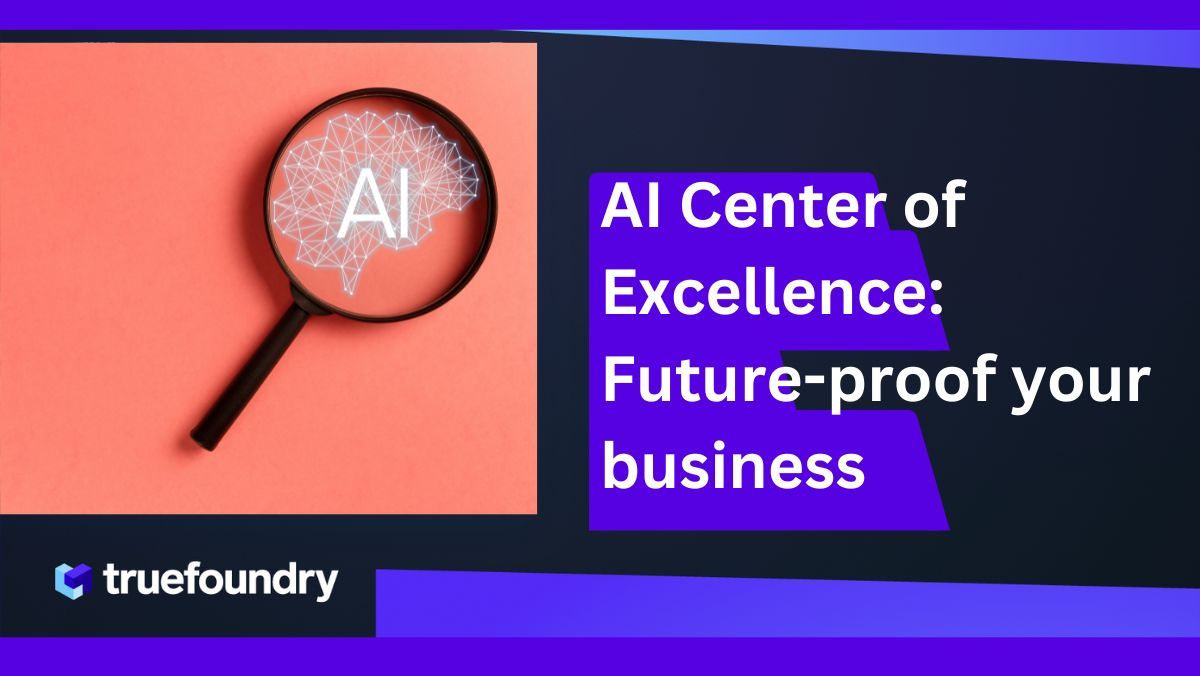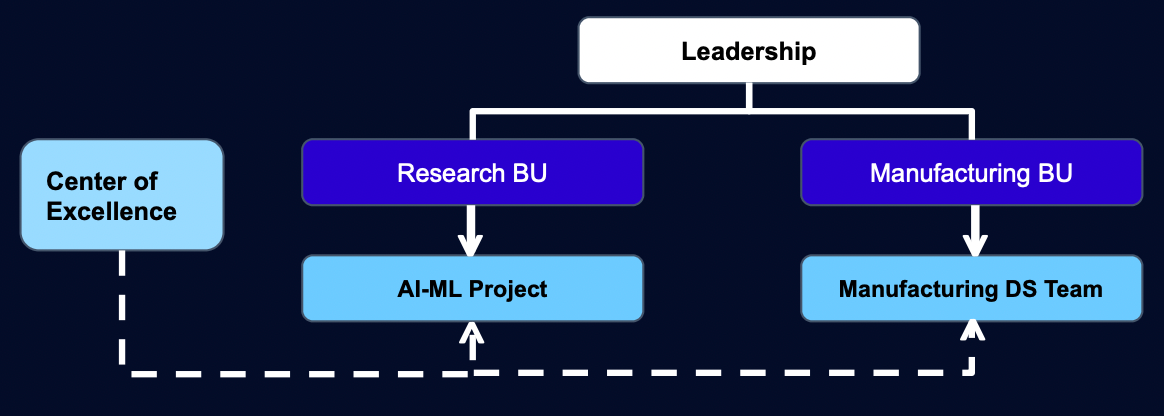AI Center of Excellence: Future-proof your business

In this blog we cover what is an Artificial Intelligence (AI) center of excellence and how it is important for companies to meaningfully explore AI/ML use cases which can impact both their bottom-line and top-line effectively.

Artificial Intelligence (AI) is no longer a futuristic concept that belongs in science fiction movies. It is now a reality that a PwC study estimates could spawn an industry worth more than $15 trillion by 2030. The reason for such massive value creation by AI is the increasing amount of data being generated every day. To make sense of this vast amount of data in varied forms and take informed decisions on top of it, mere human analysis and statistical methods won't suffice. Hence, AI has become an essential tool for organisations and individuals alike.
However, effective adoption of AI in an organisation is hindered by the limited AI talent, increasing sources, form and complexity of data and the lack of standardised tools, practices and frameworks to develop AI based solutions. This makes the implementation of AI in an organisation a daunting task. But this is where an AI Center of Excellence (CoE) comes in. An AI center of excellence is an entity of dedicated experts who are responsible for cultivating a deep understanding of AI and ML technologies and developing customised solutions tailored to the specific needs of the business. By leveraging the collective expertise and resources of an AI CoE, companies can efficiently tackle challenges and unlock new opportunities for growth. Additionally, an AI CoE is also responsible for setting up the right data flows, the right engineering infrastructure and the right people to accelerate the adoption and scaling of AI based solutions.
The AI/ML CoE team and its organisational structure

An AI CoE follows a centralised model where one AI team serves the analytics, data science and AI/ML needs of all the different business units (BUs) of the company. The AI CoE is responsible for understanding the business pain points of different BUs, translating the pain points into problem statements and ideating and executing AI/ML based projects to address those pain points. Such a model helps concentrate resources and talent pools for all the AI/ML needs of the company leading to far a more effective and efficient way of building the AI/ML practice in the organisation.
This team is typically headed by a seasoned AI leader, a Chief AI Officer (CAIO) or a Chief Data Scientist (CDO). The CAIO (or CDO) oversees the overall strategy, vision, and implementation of AI initiatives within the organization. They are responsible for aligning the AI CoE's goals with the company's objectives and ensuring that AI projects are executed efficiently and effectively.
Further, the AI CoE team consists of the following members with diverse expertise, each playing a crucial role in the success of the organization's AI initiatives,
- Data scientists and AI researchers are responsible for developing and implementing AI models and algorithms. They have a strong background in machine learning, deep learning, and statistical analysis, enabling them to extract insights from vast amounts of data and build predictive models.
- Software engineers and Machine learning Engineers work closely with data scientists to operationalize and deploy AI models into production systems.
- Data engineers are responsible for the collection, storage, and management of data required for AI projects. They ensure data quality, design and maintain data pipelines, and collaborate with data scientists to identify and acquire relevant datasets. Data engineers also work on data governance, ensuring compliance with regulations and implementing data security measures.
- Data Product Manager, for organizations with a large number of BUs, act as the interface between a BU and the CoE. They collaborate with data scientists and AI developers to define problem statements, validate AI solutions, and align them with the organization's goals. Data product managers also oversee the planning, execution, and delivery of AI projects.
Together, this multidisciplinary AI CoE team combines their expertise to drive innovation, develop cutting-edge AI solutions, and enable the organization to harness the full potential of artificial intelligence in achieving its strategic goals.
How can an AI/ML CoE future-proof your business?
- Firstly, it ensures that AI is being used in a consistent and standardised manner across the organisation. This leads to increased efficiency and productivity as teams are not duplicating efforts. This also enables companies to deploy more AI and ML models and scale those solutions to meet business needs in an efficient and effective manner.
- Secondly, experts from of CoE teams improve decision making across the company. These experts not only have an intricate knowledge about technologies like AI and machine learning but due to their collaboration with different BUs, also understand the industry, its challenges, and the specific requirements of the organisation. By leveraging this expertise, the CoE designs AI systems to analyse vast amounts of data, identify relevant patterns, and extract meaningful insights. Hence, improving the decision making ability of the organisation.
- Thirdly, an CoE AI enables the development of innovative products and services. By leveraging the power of data, an AI CoE designs systems to uncover valuable insights, customer preferences, and market trends that may otherwise go unnoticed. It helps the various business units analyse vast amounts of structured and unstructured data, identify patterns, correlations, and anomalies. Providing the business units with a deep understanding of customer behaviour and market dynamics and collaborating to create tailored and innovative offerings. This in the long-term provides a competitive advantage to the organization in the market.
- Finally, it leads to cost savings and revenue growth as it harnesses AI to automate processes and identify new revenue streams. A CoE leverages AI technology, to help organizations streamline and automate various processes, leading to increased operational efficiency and reduced expenses. AI-powered automation eliminates the need for manual labor, minimizing human errors and optimizing resource allocation. This was, through effective utilization of AI within an organization, the CoE promotes cost reduction, enhanced productivity, and the ability to capitalize on untapped opportunities, thereby driving revenue growth.
Steps to set up an AI/ML CoE
- Identifying business goals and objectives: The first step is to identify the business goals and objectives that the CoE will support. The CoE should be aligned with the organization's goals and objectives to ensure that the AI solutions developed are addressing the organization's needs.
- Building a team with diverse skill sets: The CoE should have experts in AI, data science, and business. This ensures that the AI solutions developed are not only technically sound but also address the business needs.
- Implementing the right infrastructure and tools: The CoE should have access to the right infrastructure and tools to develop and implement AI solutions. This includes hardware, software, and cloud services. The CoE should also have access to data storage and processing platforms such as Hadoop and Spark.
- Developing a governance framework: The CoE needs to come up with a governance framework that ensures that AI is being used in a responsible and ethical manner. This includes ensuring that the AI solutions developed are transparent, explainable, and fair. The governance framework should also include guidelines for data privacy and security.
Real-life examples of successful AI/ML CoEs
The concept of an AI CoE is not new. In fact over the past 4 years many organisations, from big to small, have started setting up an AI CoE to supercharge their AI and ML efforts. Some recent examples of such AI CoEs are,
- A major US pharma company with a global workforce of over 11,000 people across 3 continents has expanded their capabilities by building a Center of Excellence (COE) in the Machine learning & Artificial Intelligence domain. The facility is key in driving innovation for the organisation by leveraging cutting-edge AI and ML technologies like LLMs and GenAI.
- Walmart also has set-up an AI/ML CoE that is focused on improving the efficiency of its supply chain. The CoE has developed a number of AI-powered solutions that have helped Walmart reduce costs and improve customer service.
- Apart from these a number of non-tech firms have also created centralised AI oversight groups. These groups are responsible for overseeing the development and use of AI within the organisation. In addition, they may also be responsible for developing ethical guidelines for AI use and for conducting research on AI safety. Some of the non-tech firms that have created centralized AI oversight groups include- Deutsche Bank, J.P. Morgan Chase, Pfizer, Procter & Gamble, Anthem, Farmers Insurance
Case study: A $50 Bn Pharma company unlocks value by set up an MLOps CoE

Introduction: In the fast-evolving world of pharmaceuticals, companies are increasingly turning to cutting-edge technologies such as artificial intelligence (AI) and machine learning (ML) to gain a competitive edge. This case study delves into the transformative journey of a leading $50 billion pharmaceutical company that successfully harnessed the power of AI/ML and realised an impressive value of $650 million. Central to their success was the establishment of an AI Center of Excellence—a strategic initiative that propelled their AI/ML efforts to new heights.
Company Background: The pharmaceutical company in question, which we'll refer to as PharmaCo for confidentiality reasons, has been a stalwart in the industry for several decades. With a vast portfolio of medications, a global presence, and a commitment to innovation, PharmaCo has consistently been at the forefront of pioneering breakthrough treatments for various diseases. As the industry embraced the potential of AI/ML in drug discovery, clinical trials, and operations, PharmaCo recognized the need to harness these technologies effectively and efficiently.
Challenges Faced: As PharmaCo embarked on their AI/ML journey, they encountered several challenges common to organizations attempting to leverage these emerging technologies. Some of the key hurdles they faced were:
- Siloed Efforts: Different teams within the company were experimenting with AI/ML in isolated pockets, resulting in fragmented knowledge sharing, redundant efforts, and limited scalability.
- Low ROI & lack of standardisation: There was a lack of consistent practices, tools, and methodologies across the organisation, leading to inefficiencies in development, deployment & maintenance and lower ROI from AI/ML efforts.
- Operational Bottlenecks: Moving AI/ML models from experimentation to production posed significant hurdles, including infrastructure limitations, lack of integration with existing systems, and difficulties in monitoring and maintaining model performance.
- Governance and Compliance: Compliance with regulatory requirements and data privacy regulations posed significant challenges, requiring robust governance frameworks and stringent security measures.
The Journey towards AI Center of Excellence: To address these challenges head-on, PharmaCo made a strategic decision to establish an AI Center of Excellence (CoE). The goal was to create a centralised hub of expertise, processes, and infrastructure to drive AI/ML initiatives to success across the organisation. This CoE would serve as a catalyst for collaboration, innovation, and value creation from dispersed AI/ML efforts.
Key Initiatives and Achievements: PharmaCo's AI Center of Excellence embarked on a comprehensive set of initiatives to enable the successful integration of AI/ML into the company's operations. Here are some of the key initiatives undertaken:
- Cross-functional Collaboration: The CoE brought together data scientists, machine learning engineers, IT professionals, domain experts, and business stakeholders to foster collaboration, knowledge sharing, and alignment towards shared objectives and business goals.
- Standardised Workflows and Tools: To streamline the development and deployment of AI/ML models, the CoE defined standardised workflows and integrated with an MLOps platform for various aspects of the ML pipeline i.e., training, deployment and monitoring . This ensured consistency, improved efficiency, and accelerated time-to-market for new models.
- Infrastructure and Scalability: The CoE invested in building a robust infrastructure, including scalable computing resources and data storage, to support the training and inference needs of AI/ML models. This infrastructure enabled the seamless integration of models into the existing IT ecosystem.
- Continuous Integration and Deployment: Leveraging MLOps principles, the CoE implemented automated processes for model deployment, versioning, and monitoring. This facilitated seamless updates, rollbacks, and ensured model performance could be tracked in production.
- Governance and Compliance: The CoE established stringent governance practices to ensure compliance with regulatory requirements and data privacy regulations. This included data anonymization techniques, model explainability measures, and audit trails to maintain transparency and accountability.
Achieving $650 Million of Value: Through the strategic establishment of the AI Center of Excellence, PharmaCo was able to unlock an impressive $650 million of value from their AI/ML efforts. The value was realized through various avenues, including optimized drug discovery, accelerated clinical trials, enhanced manufacturing processes, improved supply chain management, and more.
How can TrueFoundry help you set up an AI Center of Excellence
At TrueFoundry, we understand the problems face by AI and machine learning teams very deeply. Having worked in the AI and machine learning teams of some of the biggest technology companies like Meta, Netflix and Gojek to name a few, we can help you set up the right practices, framework and infrastructure for your AI CoE. If you already have an AI CoE but want to make sure it's staying updated with all the new happenings around LLMs and GenAI, we can work as co-pilots in your AI and ML efforts.
The following are the areas in which we help your AI CoE,
- Set up Infrastructure for Model training and Monitoring: TrueFoundry helps your CoE set up the necessary infrastructure for model training and deployment. This includes designing and implementing scalable and reliable computing resources, data storage solutions, and infrastructure orchestration platforms. We also provide guidance on leveraging cloud services, containerisation technologies, and deployment frameworks to ensure efficient and robust model training and deployment capabilities.
- Define Standard Operating Procedures (SOPs) for AI/ML Initiatives: TrueFoundry works closely with your AI CoE to establish standardised processes and SOPs for AI/ML initiatives. This involves defining best practices and guidelines for data preprocessing, model development, training, validation, and deployment. These SOPs ensure consistency, quality, and reproducibility across different AI/ML projects undertaken by the organisation.
- Help Select AI/ML Tools and Vendors for Optimum Results: TrueFoundry provides expertise in evaluating and selecting appropriate AI/ML tools and vendors based on the specific needs and objectives of the CoE. This includes assessing tools and platforms for data management, model training, model serving, and monitoring. We offer insights into the latest advancements in AI/ML technology and help the CoE make informed decisions regarding tooling and vendor partnerships to achieve optimum results.
- Set up Practices for Review and Monitoring of AI/ML Initiatives: TrueFoundry can assist the CoE in establishing practices and frameworks for the review and monitoring of AI/ML initiatives. This involves defining key performance indicators (KPIs), metrics, and monitoring mechanisms to assess the performance, accuracy, and impact of deployed machine learning models. We can provide guidance on implementing real-time monitoring, anomaly detection, and model retraining processes to ensure ongoing performance and improvement.
So if you're looking to maximise the returns from your AI/ML initiatives and empower your business to leverage AI the right way, have a ☕️ with us
